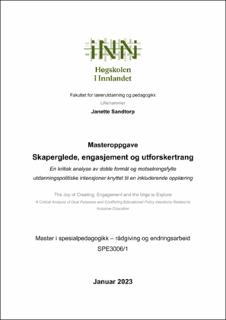Skaperglede, engasjement og utforskertrang. En kritisk analyse av doble formål og motsetningsfulle intensjoner knyttet til en inkluderende opplæring.
Master thesis
Permanent lenke
https://hdl.handle.net/11250/3057473Utgivelsesdato
2023Metadata
Vis full innførselSamlinger
Sammendrag
Denne masteroppgaven handler om doble formål og motsetningsfylte intensjoner knyttet til utdanningspolitiske målsetninger om en inkluderende opplæring. Den er en teoretisk analyse av læreplanverket for Kunnskapsløftet 2020 (forkortet LK20), og teorier som blir brukt er Gert Biesta sitt rammeverk for hensikten med utdanning og Bloom m. fl. sin taksonomi for kognitive ferdigheter. I tillegg trekkes det inn tidligere forskning på forskjellslogikker i LK20 (Espen Schaanning), konstruksjoner av samfunnsborgere i kompetansereformen Lære hele livet (Gyrid Otnes Madsen, Christin Tønseth og Liselott Aarsand) og sosialpolitiske intensjoner i utredningen Fra bruker til borger (Eivind Engebretsen og Marit Haldar). Perspektiver fra læreplanforskning og -teori vil dessuten bli brukt til å kontekstualisere og legitimere tema og problemstilling.
Bakgrunn for tema og problemstilling er innføringen av ny generell del av læreplanen (overordnet del) og nye læreplaner for fag skoleåret 2020-2021. Et påfallende trekk ved fornyelsen av læreplanverket er en tydelig vektlegging av elevaktive arbeidsformer og elevmedvirkning, og med dette fokuset følger også tydelige forventinger om den «aktive eleven». Ovenfor nevnte jeg tidligere forskning som vil bli trukket inn i analysene og drøfting av funn, og felles for disse er at de er kvalitative dokumentanalyser av offentlige styringsdokumenter. De tre artiklene setter søkelys på motsetningsfylte utdannings- og/eller sosialpolitiske intensjoner, og problematiserer konstruksjoner av utenforskap som de mener strider med uttalte politiske intensjoner. Uttalte forventinger om den aktive samfunnsborgeren er med å konstruere dette utenforskapet og i beskrivelser av det menneskelige mangfoldet fremstår «De sårbare, hjelpetrengende, uvirksomme» som ikke-eksisterende, ifølge Engebretsen og Haldar.
Analysene viser at det er doble formål og motstridende intensjoner i overordnet del av LK20, men at disse i mindre grad og omfang uttrykkes eksplisitt sammenlignet med den foregående generelle delen i Læreplan for grunnskole, videregående opplæring og voksenopplæring (forkortet L93). Videre viser analysene at når det gjelder verdiene skaperglede, engasjement og utforskertrang i overordnet del, så er det tydelige forventinger knyttet til den «aktive eleven» og til læring og utvikling som forutsetter ferdigheter på de øverste nivåene i Bloom m. fl. sine taksonomier for kognitive, affektive og psykomotoriske ferdigheter. Analysene av bruken og omfanget av verbet «utforske» i læreplaner for fag med utgangpunkt i Utdanningsdirektoratets forklaring av verbene i læreplanene, viser at over halvparten av alle kompetansemål, om enn i noe ulik grad, kan regnes som utforskende. Det kan dermed hevdes at det er en tydelig forventing til elevene at de først og fremst skal lære og utvikle seg ved å søke, oppdage, observere og granske. This master's thesis is about dual purposes and conflicting intentions regarding educational policy objectives for inclusive education. It is a theoretical analysis of the curriculum framework Kunnskapsløftet 2020 (abbreviated LK20), and I use the perspectives of Gert Biesta and his framework for the aims and ends of education and the taxonomy of cognitive skills by Bloom et al. In addition to Biesta and Bloom et al. theoretical frameworks, I also use selected research articles on different logics of difference in LK20 (Espen Schaanning), constructions of citizens in the skills reform Lifelong Learning (Gyrid Otnes Madsen, Christin Tønseth and Liselott Aarsand), and social policy intentions in the study From user to citizen (Eivind Engebretsen and Marit Haldar) in the analysis and discussion. Perspectives from curriculum research and theory will furthermore be used to contextualize and legitimize the topic and question of this thesis.
The context of the topic and the question is the implementation of a new general part of the curriculum (core curriculum) and new subject curricula in the 2020-2021 school year. A striking feature of the renewal of the curriculum is the expressed importance of student-active teaching methods and student participation, and thus also throughout expectations of the "active student". The selected articles I mentioned above have in common that they are qualitative document analyses of public management documents, and I use these in both the analysis and the discussion section. The three articles emphasize contradictory educational and/or social policy intentions and problematize constructions of outsideness that they believe conflict with stated political intentions. Stated expectations about the active citizen are, in their opinion, contributing to constructing this outsideness and they find descriptions of human diversity lacking descriptions of the vulnerable citizen, the citizen in need of help, and the inactive citizen.
The findings in this master’s thesis indicate that there are dual purposes and conflicting intentions in the core curriculum of LK20, but these seem to be expressed to a lesser extent compared to the preceding general part in the Curriculum for primary school, secondary education, and adult education (abbreviated L93). Furthermore, the findings show that when it comes to the values joy of creating, engagement, and the urge to explore in the overarching part, there are clear expectations linked to the "active student" and to learning and development that require skills at the highest levels in Bloom et al. taxonomies for cognitive, affective and psychomotor skills. Based on the Norwegian Directorate of Education’s explanation of the verbs being used in the curricula, I have shown that more than half of the competence goals in the subjects can be considered exploratory. It can thus be argued that there is a clear expectation for pupils that they should primarily learn and develop by searching, discovering, observing and investigating.
